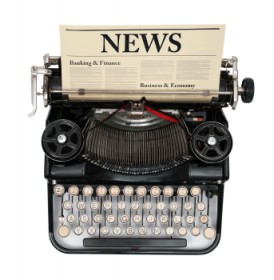For the last five years, Inbox Zero was the holly grail for many who wanted to save time dealing with email. But did it really help and reduce email overload? Is your business email etiquette and social media footprint helping or hampering your chances of a new job? How quickly can you spot fake news? These are some of the topics we highlight for this month.
1. What is the best way to manage your inbox and email overload? Over the years many different approaches to email management have been touted as the salvation for everyone suffering from business email overload. These include Inbox zero which many pursued as the holy of grail of business email management. Now Merlin Mann its inventor doubts its effectiveness and suggest that it might indeed be a complete waste of time. So what are we left with, the sledge hammer or goldfish approaches? In this Guardian guest blog, Monica reviews the options.
2.Eight email (etiquette) mistakes which bug your colleagues. Adding kisses and emoticons, not including a greeting and informal content are just some of the things you might be doing with email which annoys your colleagues. This is what a recent study by CV-Library revealed. Sending emails well out-side normal office hours is also very annoying. None of this is new but these are also business email etiquette habits which might be costing you your next job (including when emailing recruitment companies).
Check your business email etiquette using the Mesmo Consultancy on-line analytical tool. It is so easy to fall into sloppy habits as we work under increasing time pressures. Make sure this is not happening to you and that your business email etiquette is not jeopardising your next job. For more tips see the Mesmo Business Email Etiquette video the Five S Formula for Writing Effective Emails.
3. Deep clean your internet activity. Yes, the first port of call for recruiters is often the internet. What will they find out about you? Old social media posts which you forgot to remove. One of us was recruiting for a CEO. After finding information about a potential candidate they phoned a business associate who might know more. Yes, you guessed, the candidate did not make it past the first round. You cannot remove all the content for example reputable news content. However, you can clean up your social media posts as this article explains.
4. Corporate leaders: keep your Yammering in check. It is not just the Millenials and Snowflakes that need to be mindful of what they post on the web. CEOs too can sometimes wreak havoc with their posts as Jean- Sébastien Jacques CEO of Rio Tinto found. It is easy to get carried away by the ease of posting and one’s own self-importance. In the process as Mr Jacques and others have found they can reveal too much personal information and sensitive data which causes mayhem. On the other hand there is a line of thought which says there is no such thing as bad publicity. It’s a very fine dividing line as these articles have demonstrated and which need treading with great care and attention.
5. Spotting fake news. Pre the web, we used to say there are lies and dam lies. We were taught to study the statistics used and look for inconsistencies etc. Whilst this is still a vital skill, the challenge is how to spot news on social media which is fake. Here is an excellent concise guide on how to do it.
Tags: business email etiquette, Business email overload, Fake News, inbox zero, Mesmo Consultancy, Millenials, Snowflakes, The Guardian, Yammer
What would you rather have – a good night’s sleep or win the lottery? Choose the former to improve your well-being and happiness (and reduce business email overload). Sleep is now recognised as one, if not the main, contributor to our well-being. This is according to the latest survey from National Centre for Social Research. When you are rested, your self-esteem is higher, you are more relaxed and perform more effectively. This is also what sports psychologists have found when preparing sportsmen and women for big events.
What has this to do with reducing business email overload? Ironically, the blue light from those beloved mobile devices has been found to be the most significant cause of a poor night’s sleep. The two key reasons being:
Despite the growing body of research showing how checking emails etc late at night is detrimental to our well-being, the perennial comment in workshops is: ‘my colleagues/boss work in a different time zone and I need to be available’.
Stress and mental health are key areas of concern for most organisations. Business email overload and the constant distraction from digital alerts remain amongst the top ten stressors. This is due to many factors including:
During the recent Overload 2017 webinar speakers such as Lawrence Ampofo and Dan Calisata highlighted ways to create a healthier digital communications culture. For example, using mindfulness and setting boundaries outside which people are not expected to be available. You cannot change culture in isolation but you can start to influence other people’s behaviour and question theirs when they expect you to violate normality. Once you start to make improvements then is the time to collect data to use to develop a business case for changing the wider email culture (perhaps just across your division).
Doing nothing to reduce business email overload is simply not an option these days. Not only will it ultimately damage your personal health it will deter others from working in the organisation and especially ‘Millenials’ and ‘Snowflakes’. Both expect more life-work balanced organisations. They do not see a job for life and if the organisational culture does not suit they will move elsewhere.
Here are seven ways to improve the quality of your sleep – yet stay on top of your inbox and reduce business email overload.
It can be hard to switch off, one way is to start by creating digital-free time during the day. For example, at meal times and whilst shopping. Then build-up so that ultimately you have a digital-free day over the weekends.
Other resources to help you include:
If you (or your team) need more help reducing business email overload whilst improving well-being and productivity, email or phone us now.
What are your top tips for improving the quality of your sleep?
Tags: Business email overload, Digital devices and sleep, Email and sleep deprivation, Mesmo Consultancy
 Five articles of note exploring business email overload and how digital devices have hijacked our memory and quality of sleep.
Five articles of note exploring business email overload and how digital devices have hijacked our memory and quality of sleep.
Headspace. Whilst thinking of de-cluttering the mind, have you tried the Mindfulness App ‘Headspace’? Yes, it means accessing your digital device, but you can do so without being disturbed, just turn off all new digital alerts! We love it as a way to clear the mind either before trying to be creative or travelling and trying to stop your mind racing with the train/plane.
Tags: Business email overload, David Taylor, Email and sleep deprivation, Headspace, Nicolas Carr, NLP, Smart phones sleep
I advocate that using a conventional notebook is one way to reduce business email overload. What will you do with an extra 45 minutes a day every working day? That’s what I asked participants at my PA-Life Training session this week. The top three responses were:
Pukka Pads, one of my sponsors, provided some executive pocket notebooks as prizes for the day. One went to the ‘walk’ response. Why?
The digital invasion was predicted to kill off the stationary business. However, look around a meeting or the office generally. It never ceases to amaze me the high percentage of business people who use a pen and notebook instead of a digital device. Recent statistics revealed that paperback book sales are rising instead of declining. Judging by the number of notebooks and pens on office desks and given away as marketing gizmos I suspect the same is happening to stationary. Let’s hope notebooks and pens continue to help reduce the rising volume of emails too.
What do you prefer to use when either walking or in a meeting – pen and notebook or electronic device?
Tags: Business email overload, Conventional notebooks, PA Life Training Day, Pen and Notebook, Pukka Pads, Stationary business, wellbeing
How do you de-stress whilst reducing business email overload? After all it is easy to get sucked into the inbox and look up three hours later feeling stressed. What have you achieved? Maybe a clean inbox but was the time productive?

In this guest blog from Lucy Miller she provides five top ways to de-stress to improve performance whilst at the same time reducing the email overload factor.
With so many tips out there about healthy living habits, it can be tough to determine what advice is actually worth following. One key aspect of wellness that many people overlook is that it’s not enough to just be in good physical shape; you need to keep track of your mental and emotional health as well. Here are five steps you can take to make you healthier, both physically and mentally and especially whilst you deal with your email.
1: Keep a Food Diary
The problem with diets is not only that most people have difficulty following them, but many diets, even if followed strictly, won’t necessarily help you get into better shape.
A better tactic is to keep a food diary where your record everything you eat, including and especially snacks or desserts that you’re embarrassed about and want to cut out. The reason a food diary is so helpful is that it makes you acknowledge what your diet is like and identify foods that you need to eat less of, as well as nutrients you may be lacking in your diet.
Dealing with business email overload – don’t snack mindlessly when checking emails, make sure you eat what is good for you.
2: Get Sufficient and Regular Sleep
Nutritionists and health gurus are always reiterating the importance of sleep, but many people don’t realize all the aspects of your health that sleep impacts. Not only can regular sleep reduce stress, improve your immune system, and bolster your mood, but it also keeps you functioning at optimal physical and mental levels.
The key is to not only get enough sleep — at least eight hours a night for most adults — but also to keep a regular sleep schedule. Inconsistent sleep can have a negative impact on various aspects on both your physical and mental health, and will also make it more difficult to get as much sleep as you need every night.
Dealing with business email overload – set boundaries outside which you disconnect and do not look at the inbox (and social media).
3: Monitor Your Stress Levels
Stress is another factor that can have a huge impact on multiple levels of wellness. People with high levels of stress are not only more likely to gain weight and have difficulty sleeping, but are also more likely to suffer from anxiety, depression, and other mental and emotional conditions.
A good way to avoid over-stressing yourself is to regularly check your emotional and mental health, which can be done many ways, including taking online mental health assessments. People with high levels of stress will almost always experience problems with their mental and emotional health, so keeping tabs on your mood, energy levels, focus and concentration, and other other factors can help you determine when you’re becoming too stressed, and what your biggest stressors might be.
Dealing with business email overload – as you feel your muscles tighten stop, take a break and exercise even if only for a few minutes.
4: Cultivate Your Intellect
Regularly challenge yourself intellectually and keep your mental skills sharp. There are many ways to accomplish this. Reading regularly is a great way to keep your mind sharp, or you can work on mentally simulating activities like puzzles or crosswords.
Another easy option is to get into discussions or debates with friends about topics that interest you both, as this will help hone your critical thinking skills. Anything that challenges you mentally will fit the bill, so find intellectual activities that you enjoy, whatever form they take.
Dealing with business email overload – set aside some me time when you do something to challenge you mentally.
5: Drink More Water
Most people aren’t getting enough water on a daily basis. Sixty percent of our  bodies are made up of water. Water is essential to most bodily functions, from waste removal to carrying nutrients and oxygen through the bloodstream. We are constantly losing water throughout the day, so it’s important to replenish your water levels regularly. Experts recommend drinking at least eight 8 oz. glasses of water per day, although the exact requirements for your body can vary based on individual differences.
bodies are made up of water. Water is essential to most bodily functions, from waste removal to carrying nutrients and oxygen through the bloodstream. We are constantly losing water throughout the day, so it’s important to replenish your water levels regularly. Experts recommend drinking at least eight 8 oz. glasses of water per day, although the exact requirements for your body can vary based on individual differences.
Dealing with business email overload – sip a drink after dealing with every 20 emails.
By following these simple steps, you can make healthy lifestyle changes starting today. So many people make the resolution to get healthier, but forget to focus on all aspects of health, not just the physical. By keeping tabs on your physical, mental and emotional health and making healthy choices, you can maximize your all-around wellness and performance.
 Lucy Miller is a nutrition student, marathon runner, and a passionate writer for Mind Your Zen, a brain nutrition supplement brand. She contributes on a number of blog sharing useful health tips from her research as a nutrition student. She can be reached at lucy@mindyourzen.com
Lucy Miller is a nutrition student, marathon runner, and a passionate writer for Mind Your Zen, a brain nutrition supplement brand. She contributes on a number of blog sharing useful health tips from her research as a nutrition student. She can be reached at lucy@mindyourzen.com
Tags: Business email overload, De-stress, email overload, Lucy Miller, performance